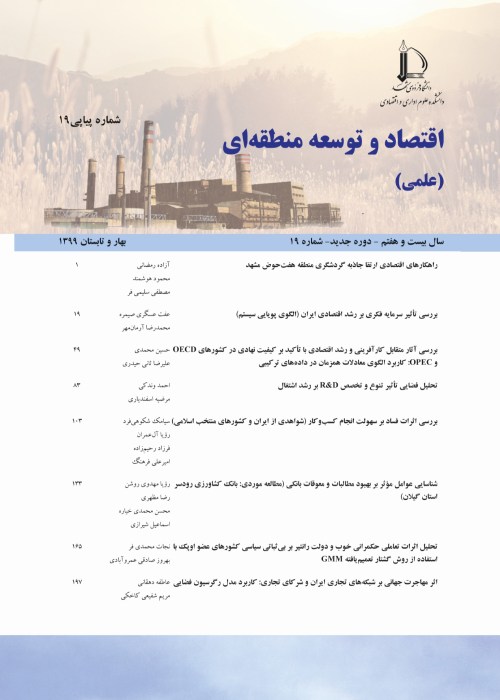Investigating the Role of Variables Affecting the Legatum Prosperity Index Using Ordered Logit Regression approach
Author(s):
Article Type:
Research/Original Article (دارای رتبه معتبر)
Abstract:
Introduction
Today, one of the main goals of policymakers is to improve the quality of life and increase the level of welfare of the society. One of the main indicators of the progress of countries is its prosperity index. Prosperity is more than just the accumulation of material wealth; it is also the joy of everyday life and the prospect of an even better life in the future. This is true for individuals as well as nations. The prosperity index is a function of various variables over time that has been investigated by researchers and institutes, including the Legatum institute. The Legatum Institute exists to promote policies that create pathways from poverty to prosperity. The journey towards prosperity is therefore not just about what we contribute, but about who we become.
Theoretical Framework:The Legatum Prosperity Index is a framework that assesses countries on the promotion of their citizens’ flourishing, reflecting both wealth and wellbeing. It captures the richness of a truly prosperous life, moving beyond traditional macroeconomic measurements of a nation’s prosperity, which relies solely on the indicators of wealth such as average income per person (GDP per capita). This makes it an authoritative measure of human progress, offering a unique insight into how prosperity is forming and changing across the world.
The Legatum Prosperity Index offers a unique insight into how prosperity is forming and changing across the world. The Index is distinctive in that it is the only global measurement of prosperity based on both income and wellbeing. Traditionally, a nation’s prosperity has been based solely on macroeconomic indicators such as a country’s income represented either by GDP or by average income per person (GDP per capita). However, most people would agree that prosperity is more than just the accumulation of material wealth. It is also the joy of everyday life and the prospect of being able to build an even better life in the future. In recent years, governments, academics, international organizations, and businesses have increasingly moved their attention towards the indicators that measure wellbeing as a complement to GDP. Indeed, the Index not only recognizes the need for a country to promote high levels of per capita income but also advocates improvements in the subjective wellbeing of its citizens. The 2017 Legatum Prosperity Index is based on 104 different variables analyzed across 149 nations around the world. The source data includes Gallup World Poll, World Development Indicators, International Telecommunication Union, Fragile States Index, Worldwide Governance Indicators, Freedom House, World Health Organization, World Values Survey, Amnesty International, and the Centre for Systemic Peace. The 104 variables are grouped into 9 sub-indexes, which are averaged using equal weights. The 9 sub-indexes are:Economic Quality
Business Environment
Governance
Education
Health
Safety & Security
Personal Freedom
Social Capital
Natural Environment
For example, personal freedom includes freedom of speech and religion, national tolerance for immigrants and ethnic and racial minorities. The Social Capital sub-index includes the percentage of citizens who volunteer, give to charity, help strangers, and who feel they can rely on family and friends.
Methodology
The present research is attempting to study the effects of different sub-indices on the overall prosperity index in 2015 using Ordered Logit Regression model. Ordered Logit models are used to estimate the relationships between an ordinal dependent variable and a set of independent variables. According to the ranking of countries by the Legatum Institute to four groups of low-welfare, lower than middle welfare, higher than middle welfare and high welfare countries, the effects of welfare sub-indices on the overall index is investigated for 142 countries. The dependent variable is the welfare state of the countries, which is classified into four main categories according to the division of the Legatum Institute and the selected explanatory variables including economic, entrepreneurship, governance, education, health and social capital indicators.
Results & Discussion
According to the results, we understand that all variables are significant at level of 10%, but education index is not significant. On the other hand, health and social indices at the level of 1%, entrepreneurship and government indices in level of 5% and economic sub-index are also significant at level of 10%. Therefore, due to significant and positive coefficients of these variables, it is safe to say that these variables have positive and direct effects on prosperity in every country. Therefore, increasing independent significant variables would increase possibility countries to higher levels of prosperity and income.
Conclusions & Suggestions:
According to the confirmation of the parallel regression test, the results show that all variables except the education index have a positive and significant effect on the overall prosperity index. In addition, the amount of marginal effect for health index is the highest and shows that the attention of countries to this sub-indicator is more important in terms of increasing the general prosperity of a country.Keywords:
Language:
Persian
Published:
Journal of Economy and Regional Development, Volume:25 Issue: 15, 2018
Pages:
1 to 19
magiran.com/p1902549
دانلود و مطالعه متن این مقاله با یکی از روشهای زیر امکان پذیر است:
اشتراک شخصی
با عضویت و پرداخت آنلاین حق اشتراک یکساله به مبلغ 1,390,000ريال میتوانید 70 عنوان مطلب دانلود کنید!
اشتراک سازمانی
به کتابخانه دانشگاه یا محل کار خود پیشنهاد کنید تا اشتراک سازمانی این پایگاه را برای دسترسی نامحدود همه کاربران به متن مطالب تهیه نمایند!
توجه!
- حق عضویت دریافتی صرف حمایت از نشریات عضو و نگهداری، تکمیل و توسعه مگیران میشود.
- پرداخت حق اشتراک و دانلود مقالات اجازه بازنشر آن در سایر رسانههای چاپی و دیجیتال را به کاربر نمیدهد.
In order to view content subscription is required
Personal subscription
Subscribe magiran.com for 70 € euros via PayPal and download 70 articles during a year.
Organization subscription
Please contact us to subscribe your university or library for unlimited access!



